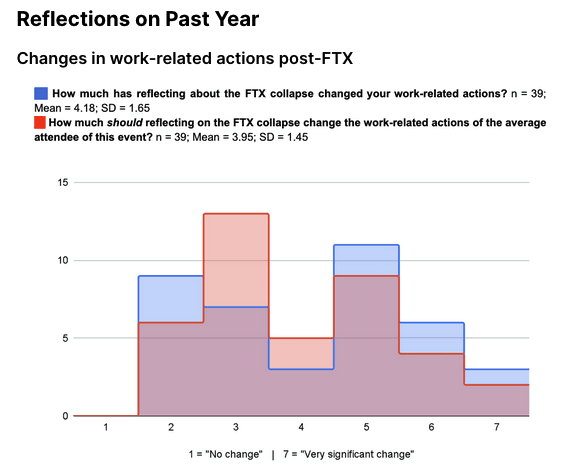A brief and belated update: When I resigned from the board of EV US last year, I was planning on writing about that decision. But I ultimately decided against doing that for a variety of reasons, including that it was very costly to me, and I believed it wouldn’t make a difference. However, I want to make it clear that I resigned last year due to significant disagreements with the board of EV and EA leadership, particularly concerning their actions leading up to and after the FTX crisis.
While I certainly support the boards’ decision to pay back the FTX estate, spin out the projects as separate organizations, and essentially disband EV, I continue to be worried that the EA community is not on track to learn the relevant lessons from its relationship with FTX. Two things that I think would help (though I am not planning to work on either myself):
- EA needs an investigation, done externally and shared publicly, on mistakes made in the EA community’s relationship with FTX.[1] I believe there were extensive and significant mistakes made which have not been addressed. (In particular, some EA leaders had warning signs about SBF that they ignored, and instead promoted him as a good person, tied the EA community to FTX, and then were uninterested in reforms or investigations after the fraud was revealed). These mistakes make me very concerned about the amount of harm EA might do in the future.
- EA also needs significantly more clarity on who, if anyone, “leads” EA and what they are responsible for. I agree with many of Will MacAskill’s points here and think confusion on this issue has indirectly resulted in a lot of harm.
CEA is a logical place to house both of these projects, though I also think leaders of other EA-affiliated orgs, attendees of the Meta Coordination Forum, and some people at Open Philanthropy would also be well-suited to do this work. I continue to be available to discuss my thoughts on why I left the board, or on EA’s response to FTX, individually as needed.
- ^
Although EV conducted a narrow investigation, the scope was far more limited than what I’m describing here, primarily pertaining to EV’s legal exposure, and most results were not shared publicly.


In case it helps, here’s some data from Meta Coordination Forum attendees on how much they think the FTX collapse should influence their work-related actions and how much it has influenced their work-related actions:
My interpretation of this is that MCF attendees have changed their professional behavior a reasonable amount (according to MCF attendees), although maybe this doesn’t address broader questions of reform (eg., ecosystem-wide work that requires substantial coordination).
And here’s a summary of responses to the question “what lessons do we need to learn from the past year”, asked directly after the above question:
I thought that this might be relevant when discussing how much or little has been done post-FTX.
My personal guess is that public discussions on the Forum under-represent changes to org policies, institutional norms, and fuzzy updates about who to trust how much.
(I work at CEA, so I could be very biased.)
Becca, Nicole and Max all stand out as people who I think burned out trying to make things go better around FTX stuff.
Also Claire leaving her position worsened my expectations of how much Open Phil will do things that seem bad. Alexander also seems substantially worse than Holden on this dimension. I think Holden was on the way out anyways, but my sense was Claire found the FTX-adjacent work very stressful and that played a role in her leaving (I don't thinks she agrees with me on many of these issues, but I nevertheless trusted her decision-making more than others in the space).